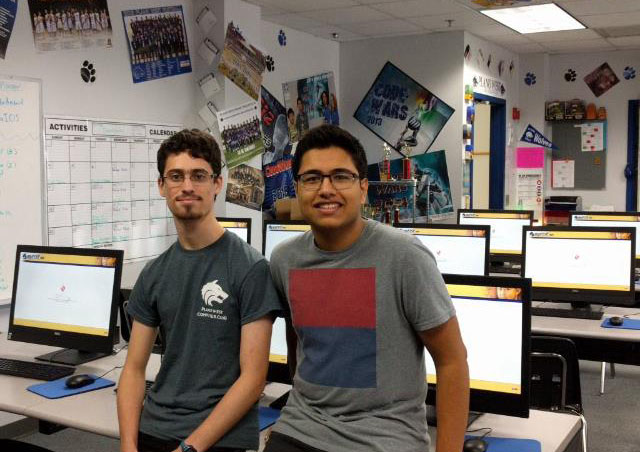Student Creators of Egenda
Seniors Ari Cohn and Ritvik Annam stand in AP Computer Science lab, E501.
September 29, 2016
Seniors Ritvik Annam and Ari Cohn released Egenda, an application for iOS and Android, on Aug. 26, 2016 to replace the traditional paper planner. They started by sketching the design out on legal pads. The idea was simple: allow students to manage their hectic daily schedules and organize homework, quizzes, projects and tests.
“When I had a planner, I would end up losing it at some point,” Annam said. “One thing that students don’t lose is their phones and that allows them to keep track of their homework and have a planner directly built into their phones instead.”
Annam and Cohn consider business another possible purpose for Egenda, with users replacing classes with clients. However, for now they are focused on continuing to target a student audience.
“It’s easier to focus on school,” Cohn said. “It incentivizes more people to download it.It’s good to have a narrow focus so people see it and go ‘Oh I can use that for school’ and then other people may realize they can use it for other things as well.”
Annam and Cohn plan to continuously implement innovative ideas and update the features on Egenda, their first priority being to allow students to sync their assignments across all their devices.
After creating the code for the app, both students contacted their friends with different devices and recruited them to act as beta testers. Senior Chetan Reddy was one of the select few chosen to test Egenda’s functionality.
“Ritvik, Ari and I are a really close group of friends, so they never actually asked me whether or not I wanted to test,” Reddy said. “They just assumed I’d be willing to do it. They assumed correctly though and the process of testing was very interesting.”
Reddy and the other beta-testers were added to a Facebook messaging group and told to try and “break the app” by the creators so they could discover and remedy bugs prior to its release.
“All of the beta testers basically tried some crazy stuff to crash the app,” Reddy said. “It doesn’t seem like there’s a lot to plan for in a homework agenda app, but we found quite a few bugs in the first stages of testing, such as not being able to change the color of a class or not being able to add a certain number of classes.”
Around the beginning of August, testing for the app began. It underwent about a week or two of intensive testing to get the app ready for school. Annam and Cohn were able to cut the testing time to a short period because their code did not have very many bugs.
“At one point, I remember crashing the app by creating 50 classes with the same name and color,” Reddy said. “When the general public uses the app, you have to be able to plan for every single possibility because you never know what crazy stuff people will try.”
When the app was finally released, it acquired immediate recognition with more than 1,000 downloads in its first week. Annam and Cohn’s success with Egenda was further placed in the limelight when they were featured on the cover of The Star Courier. They were also contacted by the radio station KILF-FM 93.3 to give an interview on air.
“The whole radio segment was six minutes, which is a little longer than the three minutes they told us it was going to be,” Annam said. “The fact that we were able to talk for so long was pretty exciting.”
Annam and Cohn were both excited by the positive press and eager to publicly promote their project.
“That was really big for us,” Annam said. “It signifies that you’re going into the tech world, and you’re becoming a part of it. In the community, people are recognizing you as growing tech leaders.”




